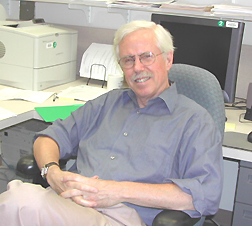CLINICAL BIOETHICS: ANOTHER FACET
 |
|
New
Face in Town: Dan Brock has joined the CC Department of Clinical
Bioethics
|
Dan Brock was an economics major who became an investment banker and then decided to try his hand at something he thought would be more "worthwhile."
So he returned to school, got a doctorate in philosophy, and emerged with an interest in a field whose name had yet to be coined: bioethics.
Since that time, more than 30 years ago, he has contributed to some of the major doctrines shaping the ethical practice of modern medicine, including the landmark Deciding to Forgo Life-Sustaining Treatment. This work was performed in his capacity as staff philosopher on the President’s Commission for the Study of Ethical Problems in Medicine in the early 1980s.
On June 30, Brock began a five-year appointment as an NIH senior scientist in the Department of Clinical Bioethics, where his new unit on ethics and public health will center the department’s explorations into health policy and priorities.
Brock intends to continue his already extensive research on the prioritization of health-care resources and the implications of advances in genetics knowledge and technology. Much of his work has involved developing alternatives to the "ethically inadequate" cost-effectiveness standard for resource allocation. "Cost effectiveness is a useful piece of information," he says, "but it ignores equity and justice"—not to mention common sense, such as when capping teeth was ranked above appendectomy in Oregon’s attempt to prioritize Medicaid expenditures using a cost-effectiveness standard.
As the recipient of an ELSI (Ethical, Legal, and Social Issues) grant from NHGRI, he and three other philosopher–co-authors produced the book From Chance to Choice: Genetics and Justice (Cambridge University Press, 2000). "New capacities to shape our children can raise new issues of social justice," Brock observes, noting that his writings on responding to moral obligations to prevent genetically transmitted disease have been viewed as sending a "threatening and offensive message" by some groups representing disabled people. "It’s an emotionally charged issue."
On the horizon, Brock adds, is the related issue of effecting genetic modifications not to prevent disease but to enhance normal human abilities, much as is already happening in the psychopharmacology arena. He cites the use of prescription medications to boost everyday function, such as antidepressants to counteract shyness. Gene manipulation for similar ends "should be a public worry before we actually need to confront it," he says.
Brock comes to NIH from Brown University, in Providence, R.I., where he had a joint appointment in the Philosophy Department and the medical school. He was Charles C. Tillinghast, Jr. University Professor, professor of philosophy and biomedical ethics, and director of the Center for Biomedical Ethics.
Brock has been philosopher-in-residence at Rhode Island Hospital, a member of the Ethics Working Group of the Clinton Task Force on National Health Reform (along with Ezekiel Emanuel, now director of the NIH Clinical Bioethics Department), and a consultant to the World Health Organization on genetic testing and reproductive control. http://www.bioethics.nih.gov/emanuel.html
He was a senior visiting scholar at NIH from September 2001 to May 2002—and he turned down an offer of first chair in bioethics at England’s Oxford University before accepting his NIH appointment.
